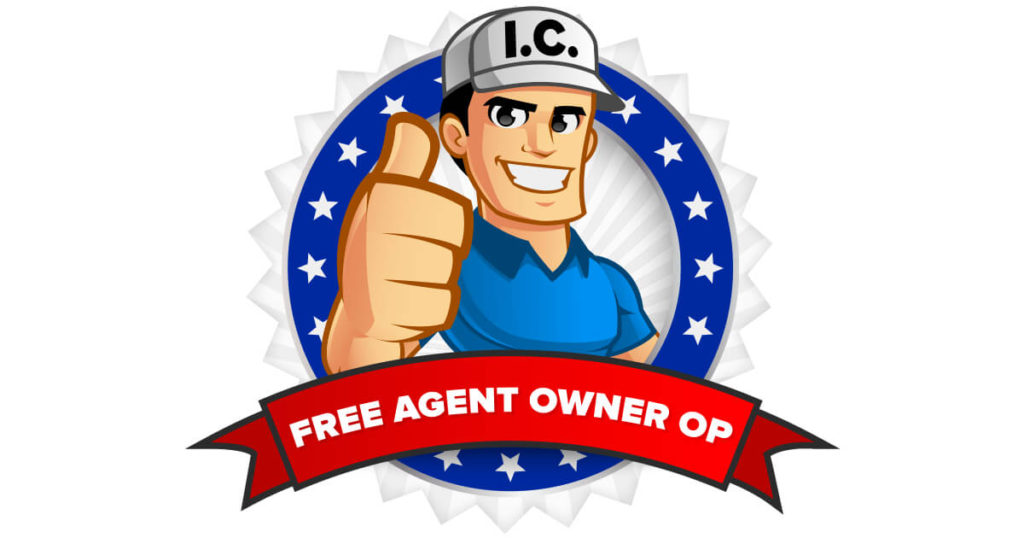Lease Owner Operator vs MC Number
Deciding whether to lease on to a Motor Carrier or get your own MC number is a big choice for any Owner Operator.
At some point, every trucker asks themselves—should I run under my own authority or haul for an existing carrier?
It’s a big step to get your own MC number, so take some time to weigh the pros and cons first.
This blog is here to help you figure it all out!
Owner Operator vs Carrier
First, let’s quickly get the basics out of the way–what’s the difference between an Owner Operator and a Motor Carrier?
Owner Operator:
- An Owner Operator owns his own truck and wants to operate it to haul freight for hire.
- He doesn’t have his own customers, instead he leases on to a Motor Carrier.
- That Motor Carrier does have customers and hires the Owner Operator to haul the freight.
- The owner operator is not an employee.
- He’s working as an independent contractor–on behalf of or for the benefit of that motor carrier.
- An Owner Operator has a DOT number for his truck, but not an MC number.
Motor Carrier:
- Motor Carriers have DOT numbers on all their trucks too.
- But they also have one MC number–Motor Carrier Authority.
- FMCSA requires vehicles hauling freight for hire across state lines to have a Motor Carrier Authority.
Where it can get Confusing:)
An Owner Operator is typically a guy with a truck hauling for one Motor Carrier.
When that one man band wants to contract for freight under his own name, he’ll need to get his own MC number.
That single trucker then becomes a small Motor Carrier.
Why point this out early in…
Because these terms get searched a lot!
- Owner Operator Trucking Authority
- Owner Operator Authority Cost
- What is Owner Operator Authority
If you want to haul freight for hire across state lines under your name, you need a Motor Carrier Authority.
Granted, once you get your own MC number, some people might still call you an Owner Operator—especially big carriers or brokers:)
Bottom line–an Owner Operator with his own MC number is a small Motor Carrier.
Owner Operator vs Own Authority
If you’re thinking about taking the leap to get your own MC number, it’s time to treat it seriously.
You’re starting a whole new small business, and that means you’ll be in charge of everything!
Yes, it’s an exciting idea, but take your time.
Here are just a few key questions to ask yourself:
- Where will your freight come from?
- Are you planning to use load boards or work on building your own customers?
- Do you have someone (maybe your wife?) who can handle the paperwork side of things?
- Have you researched any of your upfront costs?
- How does your current overhead compare to what it’ll be when you’re running on your own?
- Is your truck and equipment in good shape to avoid bad safety scores down the line?
- Have you familiarized yourself with the FMCSA portal?
It’s a big move, but if you get your ducks in a row you can be a successful independent small Motor Carrier!
We’ll help you out with some easy to follow steps on How to Get an MC Number.
New Motor Carrier Authority
There are plenty of perks to having your own authority in the trucking business.
You’re running the show now.
Here’s why you should think about it:
- Be your own boss: Take charge of your career—pick your loads, set your rates, and create a schedule that works for you.
- Boost your income: Work directly with shippers or brokers to lock in the best rates and earn more.
- Keep more of what you make: With your own authority, you get to keep a bigger share of the revenue after expenses.
- Work on your terms: Enjoy the freedom to work when and where you want while staying within HOS rules.
- Room to grow: Ready to scale up? Hire drivers, add trucks, and take your business to the next level.
- Build value: Establish your own customer base—it’s an investment with resale value down the road.
- Save on taxes: Take advantage of tax deductions for business expenses and keep more of your money.
Getting your own authority is a big step, but it comes with some serious freedom and opportunity!
Owner Operator Insurance vs Motor Carrier Insurance
When you’re leased to a Motor Carrier, they take care of your Primary Commercial Auto Liability.
The Owner Operator provides his own NTL–Non Trucking Liability.
If the Owner Op gets into an accident on the job, it’s the Motor Carrier’s insurance that kicks in.
For anything closer to home, like personal errands, the Owner Operator’s NTL (Non-Trucking Liability) coverage comes into play.
Once you become a Motor Carrier yourself, things change.
You’ll need your own Primary Commercial Auto Liability Insurance.
FMCSA requires Motor Carriers to insure all vehicles they own or operate, with specific minimum limits.
Since Primary Commercial Auto Liability covers you 24/7, it’s more expensive than NTL.
That’s why the first thing you need to determine is how much your insurance is going to cost!
If you don’t know your potential overhead upfront, how will you know what you need to make just to break even?
Already know which truck you’re using? Get a quick estimate with a CIS Commercial Truck Insurance Quote Online.
Or just give us a call at CIS! (330) 864-1511
We love helping new startups—our 5-star reviews say it all.
We are CIS, and We Make Your Truck Insurance Easy!
Author
Shelly Benisch, CIC, TRS started Commercial Insurance Solutions, Inc. (CIS) in 2002 and brings over 30 years of experience in Commercial Truck Insurance. As one of the top 25 Progressive Truck Insurance Agency Leaders in 2024, she helps Motor Carriers and Owner Operators across the country find affordable trucking insurance quotes with GEICO, Progressive and more. Shelly also writes a free Trucking Blog packed with all kinds of tips. Her team of Truck Insurance Experts have earned CIS consistent 5-star reviews and Progressive's Top 25 Truck Elite Status. For expert Commercial Truck Insurance advice, give Shelly a call at (330) 864-1511
CEO
#CISDoesThat Commercial Truck Insurance for owner operators and motor carriers.

